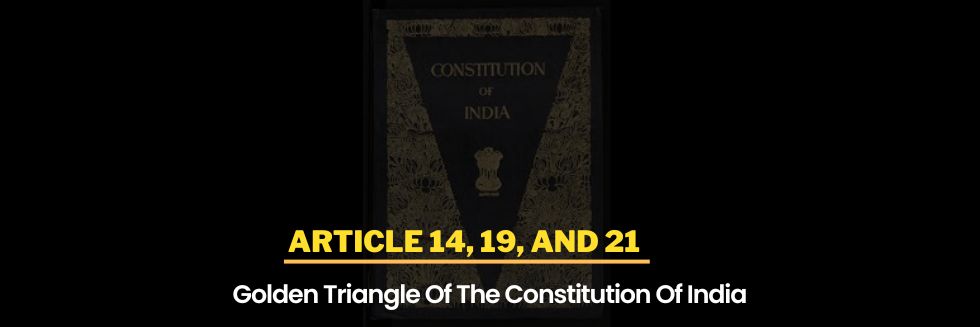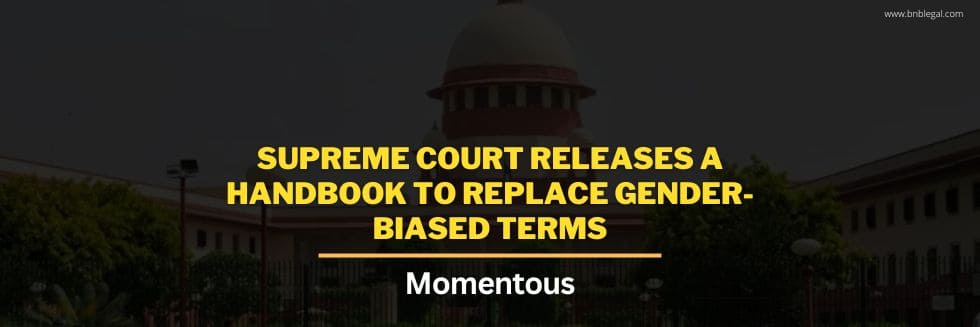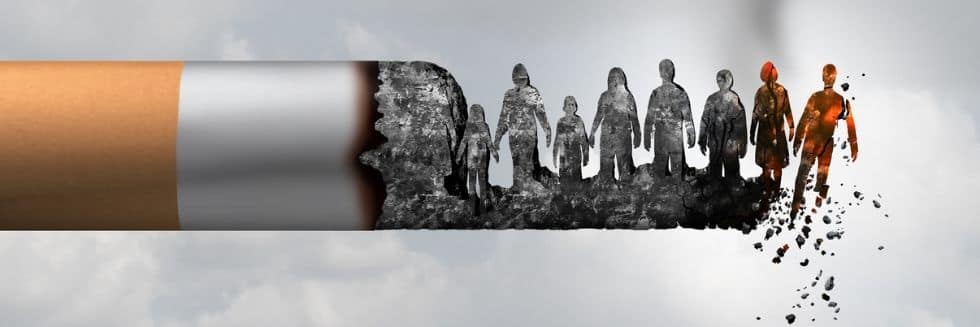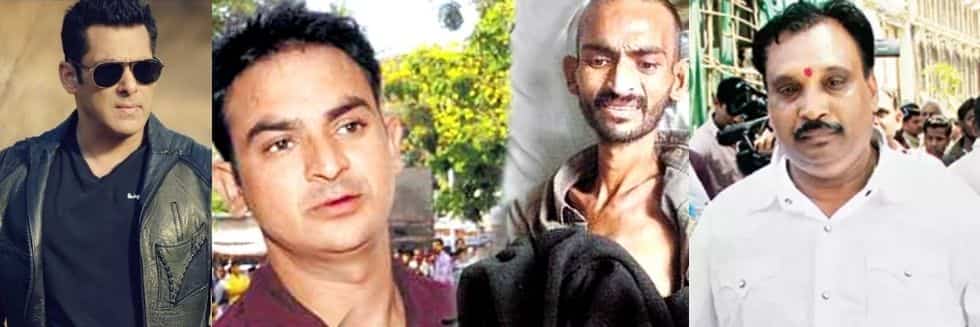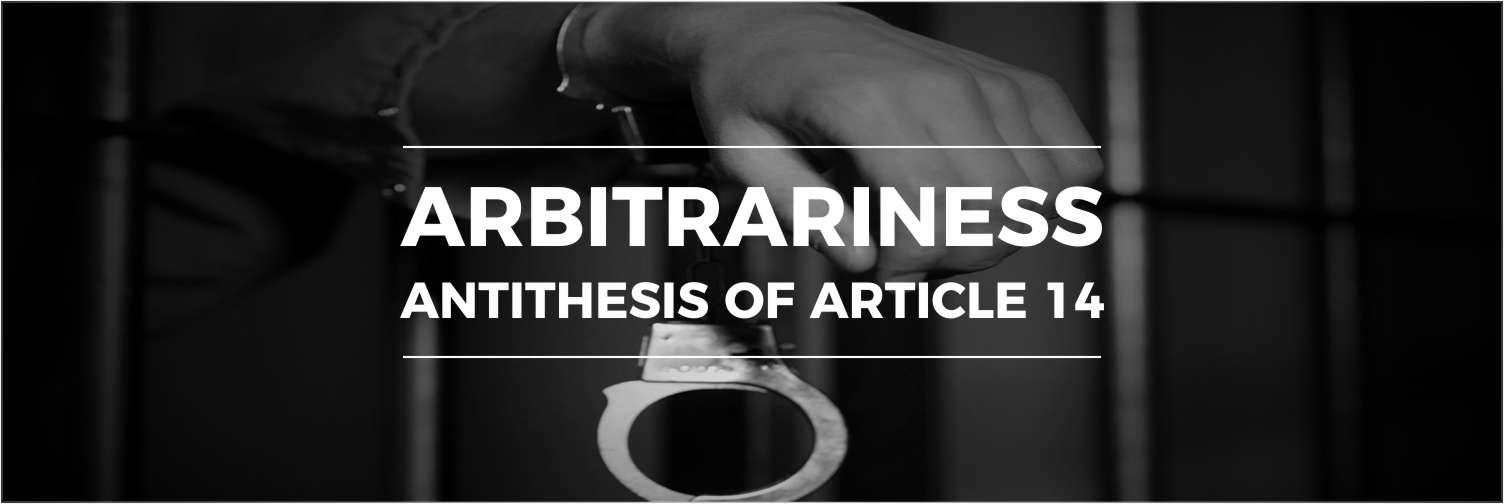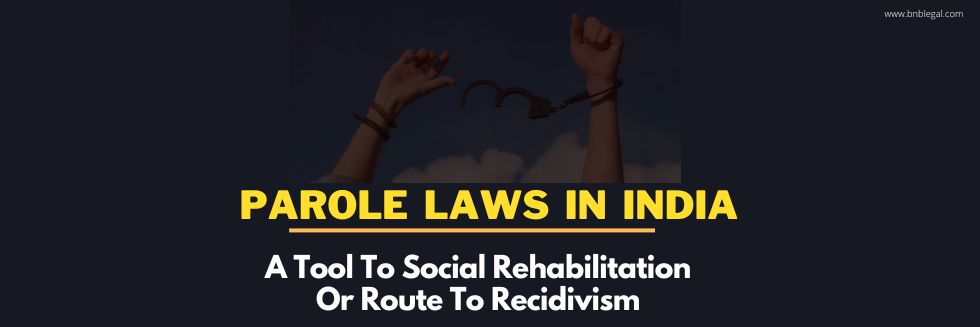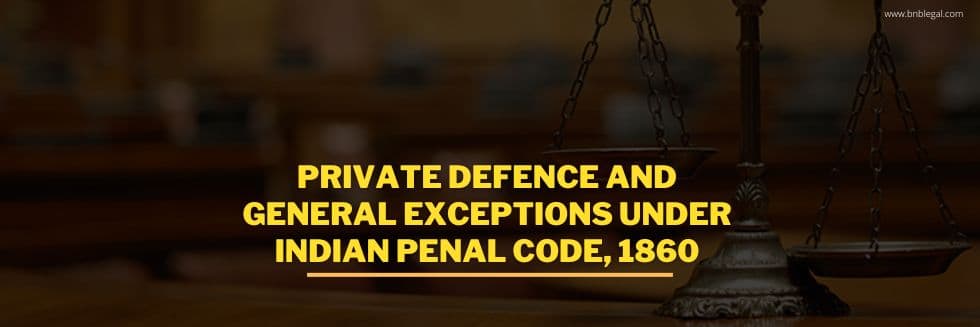Introduction
India is the largest democracy in the whole world. The credit also goes to the lawmakers of our country who created the lengthiest and the most descriptive Constitution in the world. There are 448 Articles in total, divided into 25 parts along with twelve Schedules.
The Golden Triangle constitutes three of the most important Articles of the Constitution, which shape the life of the people of the country. They are Article 14, Article 19 and Article 21. Just like a triangle, these three articles are the three corners which are interrelated to each other. This concept was first observed in the case of Maneka Gandhi v. Union of India….It held that there exists a special relationship between the three Articles and each law must pass the triple test it laid down for any law to be held as constitutional. They are:
(1) It must prescribe a procedure;
(2) the procedure must withstand the test of one or more of the fundamental rights conferred under Article 19 which may be applicable in a given situation and
(3) It must withstand the test of Article 14.
It further held, “The provisions of Article 14, Article 19 & Article 21 are to be read in synchronization and they are not mutually exclusive. These provisions in themselves though not explicitly constitute in itself principles of natural justice. A combined reading of the three provisions will give effect to the spirit of the constitution and constitution-makers……… the procedural law has to meet the requirements of Articles 14 & 19 to be a valid law under Article 21.”
Article — 14 Equality Before Law
“The State shall not deny to any person equality before the law or the equal protection of the laws within the territory of India Prohibition of discrimination on grounds of religion, race, caste, sex or place of birth.”
Article 14 considers all its citizens as equals and endeavours in affording equal treatment by the State to all its citizens. This is the main objective behind implementing this Article into the Constitution, that is, equal protection of the laws. This section categorises discrimination into the following grounds:
• Religion:
Religion is the faith of a person that he follows. India is a Hinduism-dominant country, but there are other religions also present in the country like Islam, Sikhism, Christianity, Buddhism, etc. India is a secular country, which means that it is not recognised as a religious State, unlike Pakistan, which is the Islamic Republic of Pakistan. Mention Articles 25 to 28 of the Constitution lay down the rights regarding the same.
• Race:
Race can be called the ethnicity to which a person belongs, based especially on the physical characteristic of a group.
• Caste:
Casteism has always been a part of India as a country, where people are divided into different castes based on hierarchy. Casteism has always been a rooted problem in India and to curb this, many laws have been made. Discrimination, and untouchability were major issues with regard to casteism.
Article 17 — Untouchability
• Abolition of Untouchability
“Untouchability is abolished and its practice in any form is forbidden The enforcement of any disability arising out of Untouchability shall be an offence punishable in accordance with law.” An Act called the Scheduled Castes and Scheduled Tribes (Prevention of Atrocities) Act, 1989was also enacted for the upliftment of the Schedule Castes and Schedule Tribes of India.
• Sex:
Discrimination on the basis of sex/gender is quite predominant in India and therefore Constitution provides for certain Articles which help curb the same, for example, Article 15(1), Article 16(2), Article 39a, and Article 39d.
• Place of Birth:
The Constitution also restricts discrimination on the basis of the place of birth of a person.
Landmark Cases Related To Article 14
Chiranjit Lal Chowdhuri vs The Union Of India And Others on, 1951 AIR 41, 1950 SCR 869
The court held:
“There can be no doubt that Article 14 provides one of the most valuable and important guarantees in the Constitution which should not be allowed to be whittled down, and, while accepting the statement of Professor Willis as a correct exposition of the principles underlying this guarantee, one wish to lay particular emphasis on the principle enunciated by him that any classification which is arbitrary and which is made without any basis is no classification and a proper classification must always rest upon some difference and must bear a reasonable and just relation to the things in respect of which it is proposed.” The case laid down the following principles:
(1) The presumption is always in favour of the constitutionality of an enactment since it must be assumed that the legislature understands and correctly appreciates the needs of its own people, that its laws are directed to problems made manifest by experience and that its discriminations are based on adequate grounds.
(2) The presumption may be rebutted in certain cases by showing that on the face of the statute, there is no classification at all and no difference peculiar to any individual or class and not applicable to any other individual or class, and yet the law hits only a particular individual or class.
(3) The principle of equality does not mean that every law must have universal application for all persons who are not by nature, attainment or circumstances in the same position, and the varying needs of different classes of persons often require separate treatment.
(4) The principle does not take away from the State the power of classifying persons for legitimate purposes.
(5) Every classification is to some degree likely to produce some inequality, and mere production of inequality is not enough.
(6) If a law deals equally with members of a well de- fined class, it is not obnoxious and it is not open to the charge of denial of equal protection on the ground that it has no application to other persons.
Article 19 — Protection Of Certain Rights Regarding Freedom Of Speech
“(1) All citizens shall have the right
(a) to freedom of speech and expression;
(b) to assemble peaceably and without arms;
(c) to form associations or unions;
(d) to move freely throughout the territory of India;
(e) to reside and settle in any part of the territory of India; and
(f) omitted
(g) to practice any profession, or to carry on any occupation, trade or business
(2) Nothing in sub clause (a) of clause ( 1 ) shall affect the operation of any existing law, or prevent the State from making any law, in so far as such law imposes reasonable restrictions on the exercise of the right conferred by the said sub clause in the interests of the sovereignty and integrity of India, the security of the State, friendly relations with foreign States, public order, decency or morality or in relation to contempt of court, defamation or incitement to an offence
(3) Nothing in sub-clause (b) of the said clause shall affect the operation of any existing law in so far as it imposes, or prevent the State from making any law imposing, in the interests of the sovereignty and integrity of India or public order, reasonable restrictions on the exercise of the right conferred by the said sub-clause
(4) Nothing in sub-clause (c) of the said clause shall affect the operation of any existing law in so far as it imposes, or prevent the State from making any law imposing, in the interests of the sovereignty and integrity of India or public order or morality, reasonable restrictions on the exercise of the right conferred by the said sub-clause
(5) Nothing in subclauses (d) and (e) of the said clause shall affect the operation of any existing law in so far as it imposes, or prevent the State from making any law imposing, reasonable restrictions on the exercise of any of the rights conferred by the said sub-clauses either in the interests of the general public or for the protection of the interests of any Scheduled Tribe
(6) Nothing in sub-clause (g) of the said clause shall affect the operation of any existing law in so far as it imposes, or prevent the State from making any law imposing, in the interests of the general public, reasonable restrictions on the exercise of the right conferred by the said sub-clause, and, in particular, nothing in the said sub-clause shall affect the operation of any existing law in so far as it relates to, or prevent the State from making any law relating to,
(i) the professional or technical qualifications necessary for practicing any profession or carrying on any occupation, trade or business, or
(ii) the carrying on by the State, or by a corporation owned or controlled by the State, of any trade, business, industry or service, whether to the exclusion, complete or partial, of citizens or otherwise.”
Rights Laid Down By Article 19
• Freedom of Speech and Expression
Express Newspapers (Bombay) (P) Ltd. v. Union of India held that,
“In today’s free world freedom of the press is the heart of social and politic intercourse.”
Freedom of speech and expression includes the following facets of rights:
(i) Right to propagate one’s views as well as the views of others.
(ii) Freedom of press.
(iii) Freedom of commercial advertisements.
(iv) Right against tapping o telephonic conversation.
(v) Right to telecast, that is, the government has no monopoly on electronic media.
(vi) Right against bandh called by a political party or organisation.
(vii) Right to know about government activities.
Restrictions:
Clause (2) of the Article provides for a reasonable restriction regarding freedom of speech and expression.
• Peaceful Assembly Without Arms
Section 144 Cr.P.C. and Section 141 IPC prevents any kind of assembly which is unlawful. Along with that clause (3) also puts reasonable restrictions on the same.
• To Form Association Or Union
The right to form an association or union can include forming political parties, companies, partnership firms, etc. Along with that, this right also covers the negative aspect i.e. not to form or join an association or union.
Restriction: Clause (c) of Article 19 confers reasonable restriction.
• Move Freely Throughout The Territory Of India.
In the case of Dhan Bahadur Ghori v. State of Assam, the court held that unrestricted entry of outsiders in areas inhabited by tribal folks might jeopardize their very existence and interests.
Restriction: along with the above case, clause (5) also restricts this very right in a reasonable manner.
• Reside And Settle In Any Part Of Territory of India
Restriction: clause 5 of Article 19.
• Practise Any Profession, Or To Carry On Any Occupation, Trade Or Business
In Luxmi Khandsari v. State of Uttar Pradesh, a notification was issued under the Sugar Cane Control Order to stop crushers from producing Khandsari so that the production of white sugar could be increased. It was ordered so to make the sugar available to consumers at a reasonable price and was held to be imposing restrictions in the interest of the public on the right of persons using rushers and therefore was held to be valid.
Restriction: Clause 6 of Article 19.
Article 21 Protection Of Life And Personal Liberty
“No person shall be deprived of his life or personal liberty except according to procedure established by law.”
This Article is the most important facet of the Constitution of India. Article 21 confers two types of rights upon the citizens:
- Right to life.
- Right to personal liberty.
These two rights together include certain different facets of life and liberty.
Procedure Established By Law
In the original draft of the Indian Constitution, the words used in Article 15 (which now stands as Article 21) were “in accordance with due process of law”. The Drafting Committee recommended that in place of the “due process” clause, the expression “according to procedure established by law” should be substituted.
The expression procedure established by law means the procedure as laid down in the law and enacted by the Legislature and is restricted to that.
As laid down in the case of A.K. Gopalan v. State of Maharashtra, “to deprive a person of his life or personal liberty–
(1) There must be a law;
(2) It should lay down a procedure; and
(3) The executive should follow this procedure while depriving a person of his life or personal liberty.”
Francis Coralie Mullin vs The Administrator
“Article 21embodies a constitutional value of supreme importance in a democratic society………… The right to live includes the right to live with human dignity and all that goes along with it, viz., the bare necessities of life such as adequate nutrition, clothing and shelter over the head and facilities for reading writing and expressing oneself in diverse forms, freely moving about and mixing and mingling with fellow human beings and must include the right to basic necessities the basic necessities of life and also the right to carry on functions and activities as constituting the bare minimum expression of human self.”
Kharak Singh v. State of Uttar Pradesh
“By the term ‘life’ as here used, something more is meant than mere animal existence. The inhibition against its deprivation extends to all those limbs and faculties by which life is enjoyed. The provision equally prohibits the mutilation of the body by amputation of an armoured leg or the pulling out of an eye, or the destruction of any other organ of the body through which the soul communicates with the outer world.”
Vishakha v. State of Rajasthan
“The court, taking a stance on sexual harassment in workplace, stated, “Each such incident results in violation of the fundamental rights of ‘Gender Equality’ and the ‘Right of Life and Liberty’. It is a clear violation of the rights under Articles 14, 15 and 21 of the Constitution. One of the logical consequences of such an incident is also the violation of the victim’s fundamental right under Article 19(1)(g) ‘to practice any profession or to carry out any occupation, trade or business.”
D.F. Marion v. Minnie Davis
“good reputation was an element of personal security and was protected by the Constitution, equally with the right to the enjoyment of life, liberty, and property. The Court affirmed the right to the enjoyment of life, liberty, and property. The Court affirmed that the right to the enjoyment of private reputation was of ancient origin and was necessary to human society.”
Olga Tellis v. Bombay Municipal Corporation
“The sweep of the right to life conferred by Art.21 is wide and far-reaching. It does not mean, merely that life cannot be extinguished or taken away as, for example, by the imposition and execution of a death sentence, except according to procedure established by law. That is but one aspect of the right to life. An equally important facet of the right to life is the right to livelihood because no person can live without the means of livelihood.”
Consumer Education and Research Centre v. Union of India
“Social justice which is a device to ensure life to be meaningful and liveable with human dignity requires the state to provide to workmen facilities and opportunities to reach at least minimum standard of health, economic security and civilised living. The health and strength of workers, the Court said, was an important facet of the right to life. Denial thereof denudes the workmen the finer facets of life violating Art. 21.”
K.S.Puttaswamy v. Union of India
“whenever a challenge is laid to an action of the State on the ground that it violates the right to privacy, the action of the State is to be tested on the following parameters:
(a) the action must be sanctioned by law;
(b) the proposed action must be necessary in a democratic society for a legitimate aim; and
(c) the extent of such interference must be proportionate to the need for such interference.”
Conclusion
The Constitution of India is one of the most unique Constitutions in the world. The Preamble of our Constitution is the key to the minds of the lawmakers of our country. No doubt that different parts of our Constitution have been inspired by different Constitutions of the world, but our lawmakers have moulded it to fit to the situation of our country. The Constitution shapes the life of the people of the country.
This article is written and submitted by Varsha Kumari Mishra during her course of internship at B&B Associates LLP. Varsha is a law student from Law College Dehradun, Uttaranchal University.
